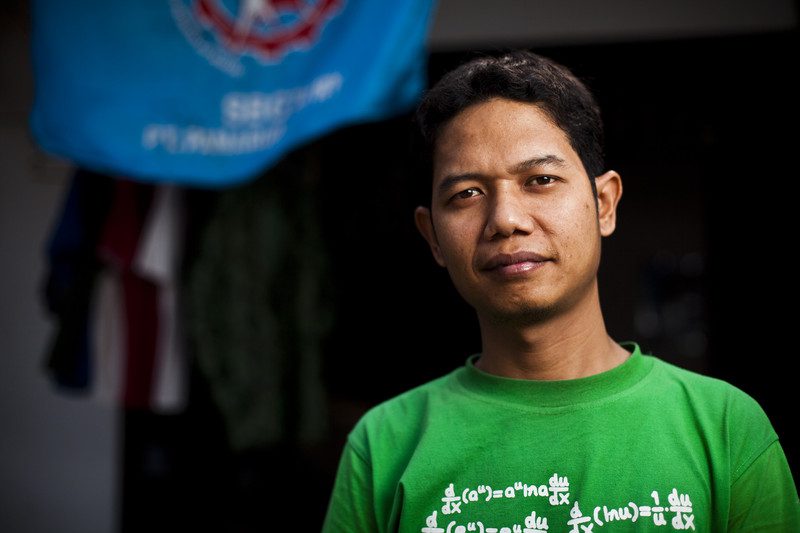Suwandi’s story
One adidas worker’s struggle
It’s 5 years since Suwandi was sacked for participating in a strike at an adidas factory, and he is still struggling to find work:
“I am not brave enough to think far into the future except about how to get a job as soon as possible. I live from day to day.”
The son of Sumatran farm labourers, Suwandi is 30 years old and “still single.” More than ten years ago he crossed the Sunda Strait to try his luck in Tangerang, Jakarta’s burgeoning garment precinct. He found a job at an adidas factory called PT Panarub.
It wasn’t long before Suwandi became involved in a trade union, protesting wages and conditions.
“I felt really uncomfortable with the work system which existed there. I knew that to oppose it, I must organise.”
According to Suwandi, after a one-day strike in 2003, Panarub identified 4 of the organisers and transferred them each to a different building in the factory.
“The criterion for such transfers is possession of the appropriate skills needed for production. We saw that these transfers were not relevant [to our skills], but the company did not care. In these new places, we were isolated . . .
“Finally, the company sacked us.”
Suwandi and his fellow organisers initially refused redundancy payments in order to protest their unfair dismissal, but after a year, poverty forced Suwandi to accept the money and ‘resign’. “I had to pay for a lease, had to eat,” he explains.
Throughout 2003, Oxfam Australia and other international organisations lobbied adidas to intervene. Following international pressure, Panarub re-employed the 4 men. Undaunted, they continued with their union organising.
Union smashed
In 2005, hundreds of workers demonstrated for an increased annual bonus to supplement their low wages, at a time when business was booming and the cost of living was climbing. Panarub management prevented a subsequent strike by locking workers inside the factory. The 33 union officials initiating the strike were sacked.
According to Suwandi, while Indonesia’s labour ministry initiated mediations, adidas imposed ‘sanctions’ on the factory in the form of reduced orders and the threat to cancel orders altogether. Suwandi doubts adidas’ intentions:
“This tactic of adidas and Panarub – that was politics. The meaning was clear: massive job losses. Where could 12,000 workers go? We took the compensation. We were not strong enough to face the propaganda which was buzzing all around us that we were responsible for making all of this happen, when in actual fact we were trying to prevent massive job losses.”
Recalls Suwandi: “The impact on Perbupas of our retreat was a leadership vacuum. The organisation was frozen for a time because there was no leadership. Members were frightened seeing all of the leaders fired.”
“But we did not surrender. From outside we consolidated members who were still loyal. We arranged discussions, strengthened, set up cadres,” until finally in 2007 the Perbupas union was functioning again under a new name of SBGTS. “There are now around 3,000 members again, like before.”
Looking for work

Nonetheless, 28 of the original 33 sacked organisers still needed work. Suwandi has repeatedly applied for work with adidas’ supply factory, without success.
“We try to look for work, but it is very difficult. We have been black-listed. I don’t know precisely how the process works, but it is our experience that we are not given work in the footwear industry in the Tangerang area.”
For a while, Suwandi made ends meet by looking after a friend’s food stall. When that went under, he found a job in a roof tile factory, which was “really hard physically.”
Suwandi is glad to think there are some adidas customers out there who are aware of the problems faced by workers.
“We hope that the users of adidas can put pressure on adidas to show real social responsibility towards its workers. Not only concerning our cases.
“For me personally, maybe consumers can put pressure so that there is help from adidas to ensure that there is no black-list and to ensure that we can be offered work in other adidas factories. . . So that we can go on with our lives and so that those of my comrades who have families can support them. Some of us have only ever worked at Panarub, meaning also for adidas, there are even some who have been there for up to twenty years.”
The Indonesian Human Rights Commission reviewed the case of the 33 workers and found their dismissal was illegal. Suwandi and several other union leaders remain unemployed and in dire financial straits. Oxfam Australia encourages adidas to ensure these workers are processed in a fair and transparent manner in recruitment at their supplier factories.
Learn more
- Read about how we are working to uphold workers’ rights in our Offside! report (PDF, 4MB)
